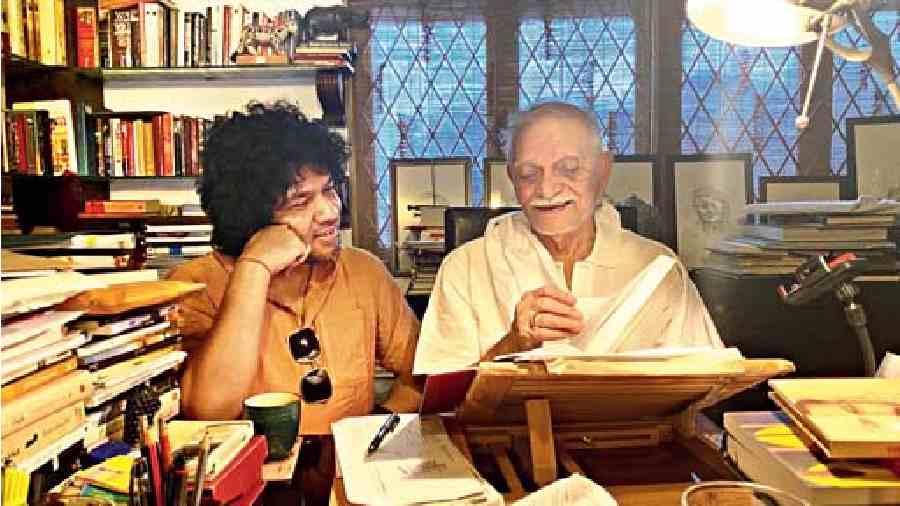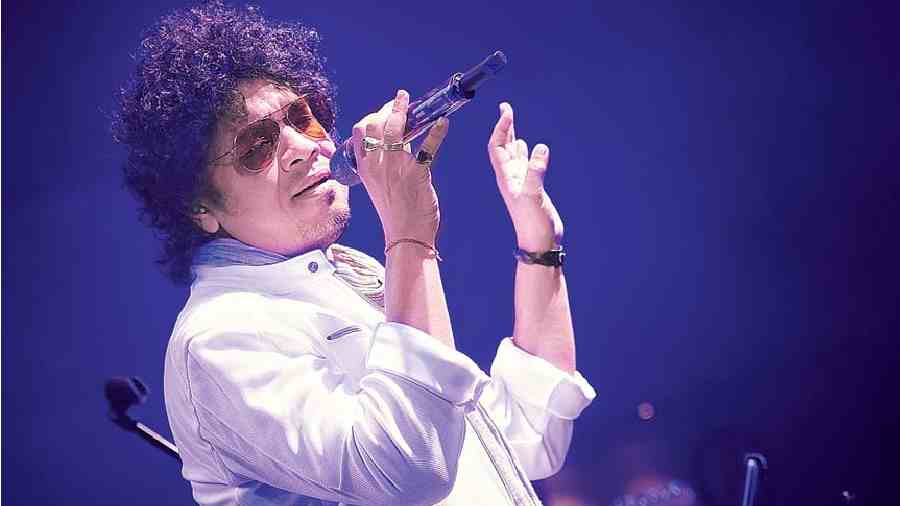Gulzar turned 88 on August 18, prompting singer-composer Papon to collaborate with the legend and also dedicate a song named Kahani koyi to him. The Telegraph chatted with Papon on the dream collab, his musical journey forward and what needs to be done to make the sounds of the North-east reach out to a global audience.
Partnering with Gulzar saab for the song on his birthday must have been very special,. What’s the feedback to Kahani koyi been so far?
People who were not messaging me all these years have been messaging me now... which is good! (Laughs) I have been hearing that this song is very special. Like that kind of vibe and feedback... so I feel good. A lot of people have told me that this sounds like a classic from yesteryears but rendered in a new capsule. Those who listen to retro numbers are especially liking the sound of Kahani koyi. I hope more music like this comes out now, more meaningful and soulful music. We don’t have that space today...
Are you saying that soulful and meaningful is completely absent from our music now?
See, it is less... I didn’t say it’s gone away, but it is definitely less. We all know that. Everything’s very fast food kind of thing now... I mean in terms of duration. How can you tell a story of a song in just two minutes? You can just give a sense of it.
What was the genesis of this collaboration with Gulzar saab?
Gulzar saab has, of course, been an inspiration for a few decades now. But working with him was not a dream that I dreamed. Back in Assam, as a youngster, we would be jamming his songs or would sing them in parties.
My wish to meet him came true a couple of years back. We started connecting after that. He embraced me like a son and, blessed me with that very pure energy that he has.
And then one day I was having tea at his place and I told him hesitatingly that I had a tune. I didn’t know how to approach him because it’s just my own song... it’s not like someone’s sponsoring it. I just said that I have a tune. He heard it and he liked the tune.
I wrote a second song and he heard that too and said that he liked the second one more. He said that he had been longing for this kind of a voice, this kind of a composition for years. And he said, ‘Thank you for giving me a composition like this so that I could write these lines’. It was amazing for him to say that. So this is what it is, you know, there was no plan. But yes, maybe a hidden wish which came true and hopefully I can do more songs with him.

Papon (left) with Gulzar
What were your biggest learnings from working with him and before that, simply by observing him at work?
I knew a lot about him because my parents (Khagen Mahanta and Archana Mahanta) were also music legends from that era. So most of what I saw in Gulzar saab was actually a reinstatement. It was like giving me reassurance that what and how I have perceived of music is true... how you sit with an idea, how you pick words, how you keep coming back to the song again and again. It’s not a one-day job. It’s not a formula. it’s a process... it’s a journey in itself.
Through that whole process, he’s still childlike, he’s still nervous about the product. Till the end of the product, he’s involved in the song, which is what I love, which is what I have seen with my parents also.
He also has a certain openness. If two people have come together for a piece of art, he believes in an open discussion.
As far as music is concerned, where do you find yourself most drawn to at this point of time?
I have been working on a ghazal album. I am trying to achieve a new sound with it, which I feel excited about. Something which has not been done before, something that I haven’t heard. I am looking at creating sounds that will present the older form in a new way, that will transcend into the new generation. I am actually working on two different projects. I am trying to find totally new sounds.
During Covid and even after that, there were no (stage) shows. We were not travelling so much. I had so much time that I made so much music in the last three years that I hadn’t made in the last 20 years. Now, I am sitting on all that and I am trying to polish all of them.
You have made a wide range of music. When you interact with your fans, which songs of yours do they recall the most? Bollywood, of course, must be very popular...
As you said, Bollywood is what takes you far and wide. But sometimes people surprise me by asking me to sing songs which are non-film. I am like, ‘How come you guys know these songs?!’ I get both surprised and happy. But yes, in terms of Bollywood, Jiyein kyun from Dum Maaro Dum, Bulleya from Sultan and, of course, Moh moh ke dhaage (from Dum Laga Ke Haisha) always come up.
A lot of your fellow composers and singers have built their own studio set-up during the pandemic, collaborated with different artistes from across the world and, as a result, have become self-sufficient in creating their own music. Has that been the same for you?
I have been a producer-composer for a while, so I have always had that
set-up. I am a technical guy. I mix myself, I engineer, I also write... I am a programmer. So I always had a studio and I worked, I make my own stuff anyway. So I have a full-fledged studio at home and the pandemic just gave me more time to spend in creating my own stuff. For singers, of course, having one’s own set-up gives you freedom... you don’t have to go to a studio to record, you can do it in your own zone.
What more needs to be done to make the sounds of the North-east travel globally?
I think it’s on us to bring out more interesting stuff. Rather than hoping someone will come and pick it up, those who are from the region like me need to make more interesting stuff, which the world would like to latch on to. We need to bring out more music, which is different, has a hint of the native, the smells of the land, so that it stands out. But at the same time, it has to fit into the world palette also so that it is easily and more widely acceptable.
